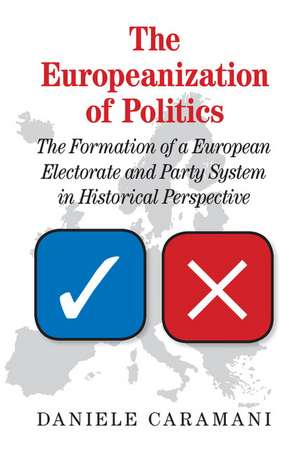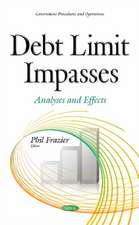The Europeanization of Politics: The Formation of a European Electorate and Party System in Historical Perspective
Autor Daniele Caramanien Limba Engleză Paperback – 8 sep 2015
Preț: 265.50 lei
Nou
Puncte Express: 398
Preț estimativ în valută:
50.82€ • 55.22$ • 42.72£
50.82€ • 55.22$ • 42.72£
Carte tipărită la comandă
Livrare economică 22 aprilie-06 mai
Preluare comenzi: 021 569.72.76
Specificații
ISBN-13: 9781107544604
ISBN-10: 1107544602
Pagini: 363
Ilustrații: 59 b/w illus. 46 tables
Dimensiuni: 152 x 229 x 20 mm
Greutate: 0.49 kg
Editura: Cambridge University Press
Colecția Cambridge University Press
Locul publicării:New York, United States
ISBN-10: 1107544602
Pagini: 363
Ilustrații: 59 b/w illus. 46 tables
Dimensiuni: 152 x 229 x 20 mm
Greutate: 0.49 kg
Editura: Cambridge University Press
Colecția Cambridge University Press
Locul publicării:New York, United States
Cuprins
Introduction: electoral integration in Europe; Part I. Framework: 1. Theoretical framework: Europeanization in historical perspective; 2. Research design: European party families and party systems; Part II. Analysis: 3. Homogeneity: convergence and deviation in European electoral development, 1848–2012; 4. Uniformity: electoral waves and electoral swings across Europe, 1848–2012; 5. Correspondence: overlapping vs distinctive electorates in national and European elections, 1974‒2012; 6. Cohesion: ideological convergence within European party families, 1945–2009; 7. Closure: the Europeanization of cabinet and coalition politics, 1945‒2009; Part III. Assessment: 8. Sources of Europeanization: supra-, within-, and trans-national; Explanations; Conclusion: toward European-wide representation.
Recenzii
'To what degree have political ideologies in different European nations converged over time? Are national politics becoming European politics? In this book, Daniele Caramani provides a deeply informed, insightful, and persuasive account of how national cleavages, party politics, and electoral behavior have been transformed across Europe since the nineteenth century. The result is an immense contribution to our understanding of the political development of Europe.' Gary Marks, Burton Craige Distinguished Professor, University of North Carolina, Chapel Hill, and Research Chair in Multilevel Governance, VU Amsterdam
'With this book, Caramani, the authority on party nationalization in Europe, extends his ideas and methodological tools to explore Europeanization. In spite of many cross-national differences, Caramani convincingly argues about the commonality among voters and parties across Europe. By weaving together a wealth of electoral, survey, and other types of data, the book provides a weighty and informative analysis.' Scott Morgenstern, University of Pittsburgh
'In the tradition of Stein Rokkan, Caramani's work seeks broad scope and long reach in portraying the development of party system configurations in Europe. Caramani's study is a necessary and welcome foundation to more fine-grained analysis of strategic interaction among parties. His research uncovers lasting patterns and slow-moving trends across European democracies, such as the early development of matching cleavage alignments and cohesion within party families or over-time swings in the fortunes of party families across Europe, as well as the correspondence of programmatic configurations of parties at both the European and the national system levels. Any investigation of democratic party competition will have to draw on Caramani's findings.' Herbert Kitschelt, George V. Allen Professor of International Relations, Duke University
'With this book, Caramani, the authority on party nationalization in Europe, extends his ideas and methodological tools to explore Europeanization. In spite of many cross-national differences, Caramani convincingly argues about the commonality among voters and parties across Europe. By weaving together a wealth of electoral, survey, and other types of data, the book provides a weighty and informative analysis.' Scott Morgenstern, University of Pittsburgh
'In the tradition of Stein Rokkan, Caramani's work seeks broad scope and long reach in portraying the development of party system configurations in Europe. Caramani's study is a necessary and welcome foundation to more fine-grained analysis of strategic interaction among parties. His research uncovers lasting patterns and slow-moving trends across European democracies, such as the early development of matching cleavage alignments and cohesion within party families or over-time swings in the fortunes of party families across Europe, as well as the correspondence of programmatic configurations of parties at both the European and the national system levels. Any investigation of democratic party competition will have to draw on Caramani's findings.' Herbert Kitschelt, George V. Allen Professor of International Relations, Duke University
Notă biografică
Descriere
This book offers a broadly comparative, historical, and quantitative analysis of electorates and party systems in Western and Central Eastern Europe since the nineteenth century.
















